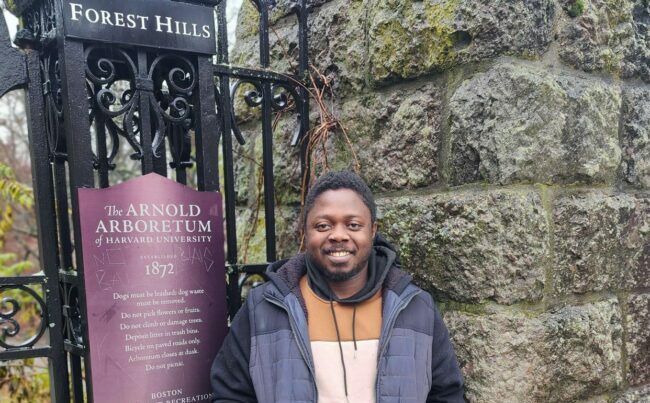The study of plant anatomy and morphology in the era of climate change provides valuable insights into plant adaptation, resilience, resource use efficiency, carbon dynamics, and ecosystem dynamics, all of which are essential for sustainable management and conservation efforts in a changing environment.
Oluwatobi Oso, a PhD student in the Department of Ecology and Evolutionary Biology at Yale University, was awarded the Cunin-Sigal Research Grant by the Arnold Arboretum of Harvard University.
The Cunin-Sigal Award is valued at $6,000 to cover his ongoing research in the field of plant anatomy, evolution, and development.
Over the years, Oluwatobi’s research has centred around plant anatomy, development, evolution, digital morphometrics, and botanical digitization, and how these can be used to tackle climate change, a subject of global concern.
“To predict and mitigate climate change, we need to understand how plant leaves sense and respond to their environment, especially changing temperature and weather patterns,” says Oluwatobi. “My research is aimed at unravelling the influence of environmental change, bud-packing, and cellular processes on leaf margin development and evolution, using microCT scanning, confocal microscopy, and phylogenomics.”
Oluwatobi emphasises that gaining knowledge about plant anatomy and morphology can reveal how plants adapt to shifting environmental conditions. Researchers can explore how the anatomical characteristics of different plant species (such as the size, shape, and structure of leaves) change in response to factors like increased temperatures, modified precipitation patterns, and higher CO2 concentrations.
“The potential findings of this research could profoundly impact our understanding of evolutionary biology. By demonstrating how environmental conditions, genetic factors, and developmental constraints affect the structure within the leaf buds in temperate and tropical regions of the world, this research offers insights into how plants might adapt to changing environmental conditions.
And by identifying the developmental mechanisms that confer resilience to environmental stressors, this research can inform conservation strategies aimed at preserving plant biodiversity, sustaining environmental health, and combating climate change.”
Oluwatobi has always been well-funded since the first year of his PhD programme. After obtaining his Masters from the University of Ibadan, Nigeria, Oluwatobi spent a few years pioneering research in digital morphometrics and 3D visualisation of leaf structure in Nigeria. This work plummeted him into being one of the few Nigerians selected for the TWAS-CSIR Graduate Fellowships in India. After spending one year in India doing research using molecular systematic techniques, scanning electron microscopy, and digital morphometrics, Oluwatobi sought to study for a PhD and continue growing in his area of botany specialisation.
In 2021, he received six fully-funded PhD admission offers from prestigious evolutionary biology and botany programmes in the United States, including from Yale University and the University of Florida. Oluwatobi chose to attend Yale University, giving him the opportunity to continue as a researcher at one of the best universities in the world, as well as making him the first Nigerian ever admitted into the programme. Oluwatobi’s fully-funded award at Yale University is valued at over $400,000 for his 5-year programme. He, Oluwatobi, has won several research and conference travel grants, and the Cunin-Sigal Award is only one of many. Harvard University deserves great credit for selecting this worthy, extraordinary scholar as the recipient of the Arnold Arboretum’s Cunin-Sigal Research Award.
Oluwatobi continues to be an inspiration to young Africans who want to go on to do big things in science. At Yale, he is heavily involved in teaching, career strategy, and volunteering. He says he is committed to strengthening communities and institutions through the empowerment and engagement of young people by applying his resourcefulness, teaching abilities, and research experience towards providing sustainable interventions and transformations to people from different cultures and backgrounds, both in Nigeria and the United States.
“I want to continue focusing on creating solutions that are both culturally sensitive and scientifically sound, while I continue to enjoy and experience active leadership opportunities and the presence of multicultural people motivated by a shared desire for academic growth, human capital development, and the advancement of knowledge through scientific discovery,” says Oluwatobi.






